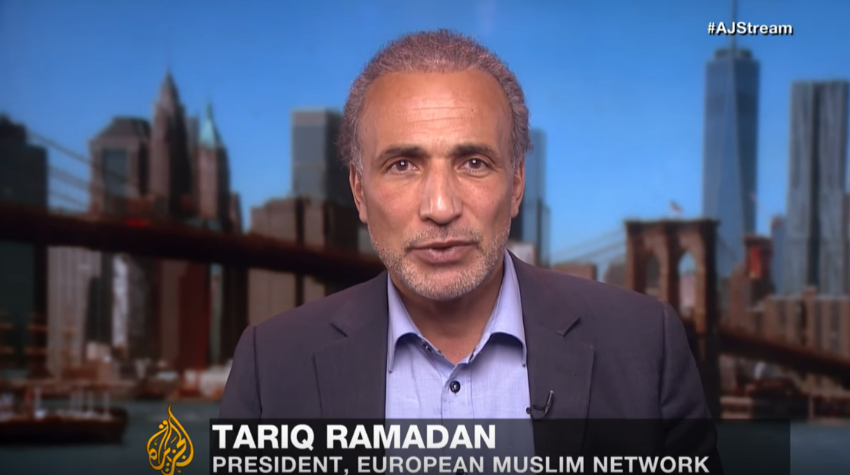BOOKS
Reviewed by William R. Klein
Much of this book’s value comes from the remarkable man who wrote it. Tariq Ramadan is a research fellow at St. Anthony’s College, Oxford University. He’s been called "a Muslim Martin Luther" and Europe’s leading Muslim scholar. In 2004 Time named him one of the 100 most influential people in the world. Also in 2004 he was to assume the Henry Luce Chair of religion, conflict and peace- building at the University of Notre Dame, but the Department of Homeland Security uncovered a $900 gift he once made to a Swiss- Palestinian support group and revoked his visa. What a mistake; he’s the kind of Muslim intellectual we need.
His grandfather, Hasan al-Banna, founded the radical Islamist group "The Muslim Brotherhood" in Egypt in 1928. This was the ideological environment in which Ramadan was raised, but he turned his back on Islamist fundamentalism and embraced a modern, progressive form of Islam. It is this form of Islam, he claims, which Muslims in the West must learn in order to live in partnership with Christians and Jews. These three monotheistic faiths, he asserts, have much in common, and by sharing their moral visions they can contribute to a greater West for people of all faiths.
Out of this conviction he addresses his book to Westerners who know little of Islam. But most of all he writes to Muslims living in the West who have little knowledge of classical Islam. They know only snippets from the Koran, the isolated verses Mullahs use to bend them to their purposes. A recent article in the American Chronicle of Higher Education says that Ramadan is having a significant, moderating influence on Western Muslims, encouraging them to embrace the modern world and assuring them that this does not mean abandoning their faith.
In writing his life of the Prophet, Ramadan’s deep reverence for Islam’s founder is evident on every page. As he tells the traditional story of Muhammad’s life, he points to significant events that portray a man different from the one presented by extremists and accepted uncritically by most Westerners.
A sampling: Muhammad had a lasting hope for peace and resorted to arms only when his followers were threatened with annihilation. The honor and respect he held for women is in sharp contrast to the humiliation women often endure from Muslim men. The Prophet’s attitude toward Christians and Jews also contradicts the conventional opinion of unceasing conflict. At one time he welcomed Christians who sought permission to pray in a mosque, and on three occasions he accepted graciously the conversion of Muslims to Christianity and did not penalize them.
People of good will must hope that we in the West of whatever religion will read this excellent book and learn from it. Is it too much to hope that Muslims in the Middle East will read it?
But while praising this book, and my praise is genuine, it seems obvious that Islam, even in its most progressive form, has yet to wrestle with the challenge of the Enlightenment. Specifically, questions raised by the Enlightenment regarding textual criticism. In the 19th century, most Christians feared textual criticism would destroy the Bible. Instead, for many it deepened understanding of and reverence for the Bible. Muslim scholars are yet to apply the science of textual criticism to the Koran. The same can be said of historical criticism. To what extent can claims of historical fact be accepted at face value, for example, that Abraham and Ishmael built the Kaba that continues to this day in Mecca?
Ramadan does not address these two issues. Nonetheless, "In the Footsteps of the Prophet" should be required reading, if for no other reason than because it introduces us to this classical Muslim scholar, Tariq Ramadan, who comes across as a genuinely good man.
IN THE FOOTSTEPS OF THE PROPHET: Lessons from the Life of Muhammad By Tariq Ramadan. Oxford University Press. 242 pages. $23
WILLIAM R. KLEIN is pastor emeritus of Second Presbyterian Church in Roanoke.
SOURCE : ROANOKE TIME & WORLD NEWS



![PALEXPO : Democratic Engagement & Justice for Palestinians [08/07/2017]](https://tariqramadan.com/english/wp-content/uploads/sites/9/2017/07/Palexpo.png)
![Bristol Festival of Ideas : Conversation with Julian Baggini [24/05/2017]](https://tariqramadan.com/english/wp-content/uploads/sites/9/2017/06/bristol.png)
![Interview on BBC Radio Ulster [06/06/2017]](https://tariqramadan.com/english/wp-content/uploads/sites/9/2017/06/p03nnqlv.jpg)
![Interview on BBC 4 : What do the London attacks have to do with Islam? What is the Muslims’ responsibility?[06/06/2017]](https://tariqramadan.com/english/wp-content/uploads/sites/9/2017/06/bbc.jpg)


This Excellant book need to be followed by onother book “LESSONS FROM THE PROPHET JESUSS” for the chritians to know JESUSS and for the Muslims as well to know more.
I don’t think that Dr. Tariq Ramadan’s ideology can be defined as rejecting his grandfather’s “radical Islamist” thinking which amounted to the creation of the Muslim Brotherhood.Further, we cannot say that he turned his back on Islamist fundamentalism and embraced a modern, progressive form of Islam: surely, to evaluate Dr. Ramadan’s path in this way would please the Western reader, but it gives injustice to the dynamism of Banna’s thought which was not all that “fundamentalist” and that Ramadan completely “rejected” Banna’s thought is an overstatement. We have had enough with the loose usage of terms “fundamentalism” or even “progressive Islam”. The writer may have attempted to evaluate Ramadan in a more dynamic manner.